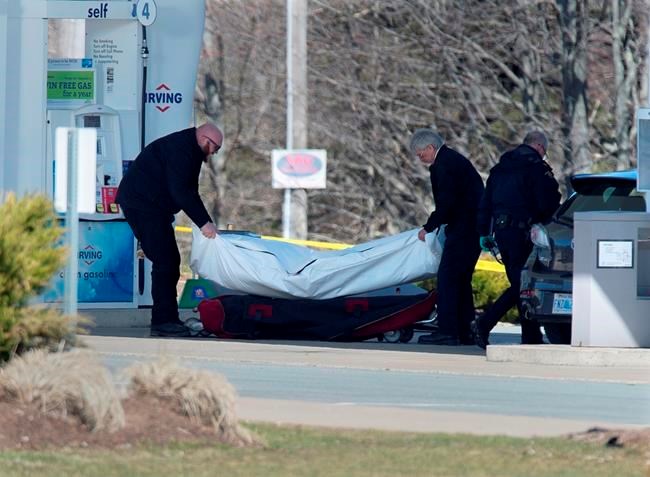HALIFAX — A coalition of groups devoted to eliminating gender-based violence across Canada is urging Ottawa and Nova Scotia to refrain from using a restorative justice approach for a promised inquiry into the mass killing that claimed 22 lives in the Maritime province.
In a letter addressed to the prime minister, Nova Scotia's premier and several cabinet ministers, the group insists such an approach would undermine the need for an independent, fully transparent public inquiry.
"We were shocked to see media reports that the launch of an inquiry into the April 2020 massacre in Nova Scotia was being held up by an attempt to graft a 'restorative approach' onto the traditional federal-provincial public inquiry," says the letter, signed by more than two dozen groups and obtained by The Canadian Press.
Restorative justice is a process that focuses on addressing the harm caused by crime by offering those involved — victims, offenders and public officials — the opportunity to meet and discuss healing and reparation outside the regular criminal justice system.
The letter says the group, which includes Women's Shelters Canada and the National Association of Women and the Law, is opposed to using the restorative justice process in this case because hearings are typically held in private and there is no mechanism to compel witnesses to testify.
"The public outcry for an inquiry was not a demand to have discrete groups of affected individuals participate in a series of private meetings," the letter says.
"The families and individuals who lost loved ones as a result of this massacre, the women and children who are subjected to misogynistic violence every day in Canada, and the Canadian public traumatized by ...(the) mass killing are entitled to the full and public justice of an inquiry that ensures public accessibility ... public accountability and transparency."
Public hearings are central to the concept of a public inquiry, said Deepa Mattoo, executive director of the Barbra Schlifer Commemorative Clinic in Toronto, a specialized counselling and legal clinic for women experiencing violence.
"Unfortunately, a restorative approach without a proper ... transparent approach would mean lack of accountability from the system," Mattoo said in an email.
"I think any process that can delay a thorough, transparent public inquiry should be put on hold and not considered at this point. Canadians deserve a clear process for accountability at this stage."
On another front, the letter points out that Nova Scotia has imposed a moratorium on the use of the restorative justice model to deal with offences involving domestic or sexual violence.
"We question whether the use of a restorative approach in this instance is a breach of this moratorium," the letter says.
Last week, Nova Scotia Justice Minister Mark Furey said the provincial and federal governments were ironing out details of how the inquiry would work, but he said there were delays because of "technicalities and legalities."
Furey has said the inquiry or review must have certain features common to public inquiries, including judicial leadership, the power to compel witnesses to testify and the ability to make recommendations to hold public agencies accountable for their actions. And he has said the investigation could take the form of a traditional federal-provincial public inquiry led by an independent commissioner.
However, Furey indicated last week that some sort of hybrid was in the works.
"We want to take a different approach to sourcing the questions that individuals would have, particularly the family members," he said on July 2. "We're taking a human-centred and trauma-informed approach consistent with some of the principles of restorative methodologies."
Furey said he wants people to come forward to tell what they know about the circumstances before, during and after Gabriel Wortman's murderous, 13-hour rampage through northern and central Nova Scotia on April 18-19.
Amanda Dale, a faculty member with the Women's Human Rights Institute, said it's important to note that it remains unclear what the minister is actually pushing for and why it is taking so long to get the job done.
However, Dale said restorative justice in not typically used in cases of murder.
"In this case, it requires live participants and a live perpetrator," Dale said in an email. She sees no evidence "that it can be used in the context of a failure of state protection services and multiple dead victims and a dead perpetrator."
She said if the goal is to "heal the community," then a more open public inquiry is needed — one that can get to the truth because it has the legal means to subpoena documents and examine witnesses.
In recent weeks, several groups and individuals have come forward to call for a public inquiry that includes a feminist lens, partly because the carnage the gunman unleashed started with a violent assault on his longtime common law partner.
In 2015, Nova Scotia created an innovative "restorative inquiry" when it appointed a committee to look into allegations of long-term abuse at a former orphanage in the Halifax area, known as the Nova Scotia Home for Colored Children.
Its collaborative approach featured "sharing circles" with former residents, black youth and community organizations.
But the hearings involving former residents were held in private. And instead of providing a list or recommendations, the inquiry's final report offered a less specific "road map" for change.
This report by The Canadian Press was first published June 8, 2020.
Michael MacDonald, The Canadian Press



